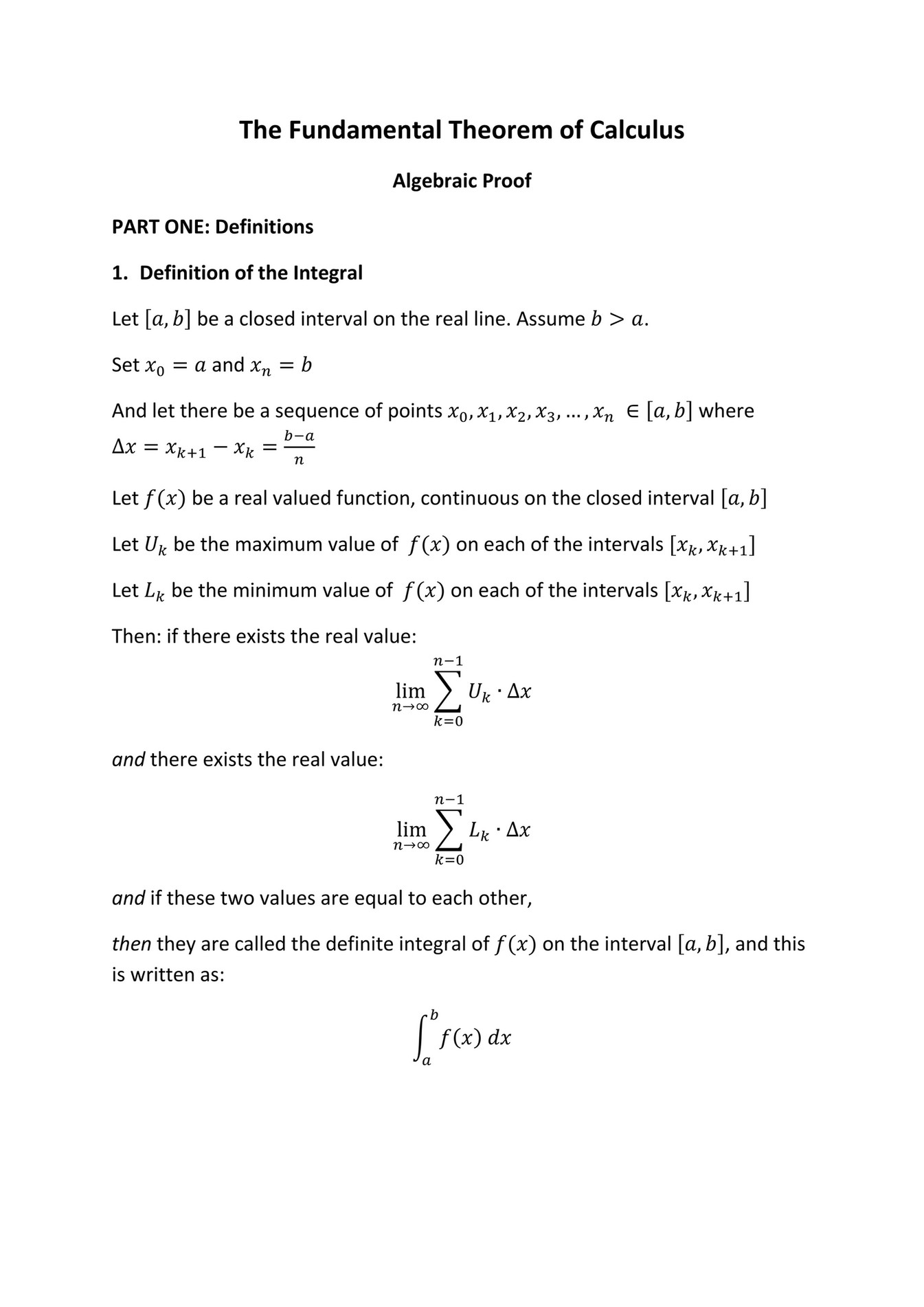Calculus is one of the most significant achievements in the history of mathematics, and understanding who created calculus is essential for appreciating its profound impact on modern science and technology. The origins of calculus are often attributed to two brilliant minds: Sir Isaac Newton and Gottfried Wilhelm Leibniz. However, the story behind its creation is far more complex and intriguing than a simple attribution to one individual. In this article, we will delve into the historical context, contributions, and controversies surrounding the invention of calculus.
Calculus is a branch of mathematics that deals with rates of change and accumulation. It provides tools for solving problems involving motion, optimization, and areas under curves. Its applications span across physics, engineering, economics, and even biology. Understanding the origins of calculus helps us appreciate its role in shaping modern scientific thought and technological advancements.
This article will explore the contributions of Newton and Leibniz, their differences in approach, and the broader historical context that led to the development of calculus. By the end of this piece, you will have a deeper understanding of who created calculus and its lasting legacy.
Read also:Jace Norman Movies A Comprehensive Look At The Rising Stars Filmography
Table of Contents
- Biography of Key Figures
- Historical Context of Calculus
- Isaac Newton's Contributions to Calculus
- Gottfried Wilhelm Leibniz's Contributions to Calculus
- The Controversy Over the Invention of Calculus
- Applications of Calculus in Modern Science
- Mathematical Foundations of Calculus
- Evolution of Calculus Over Time
- The Importance of Calculus in Education
- Conclusion and Call to Action
Biography of Key Figures
Isaac Newton: The Father of Modern Physics
Sir Isaac Newton (1643–1727) was an English mathematician, physicist, astronomer, and author who is widely recognized as one of the most influential scientists of all time. Below is a brief overview of his life:
| Full Name | Isaac Newton |
|---|---|
| Birth Date | January 4, 1643 |
| Place of Birth | Woolsthorpe, Lincolnshire, England |
| Major Contributions | Calculus, Laws of Motion, Universal Gravitation |
Gottfried Wilhelm Leibniz: The Polymath of the Enlightenment
Gottfried Wilhelm Leibniz (1646–1716) was a German philosopher, mathematician, and polymath. His contributions to mathematics and philosophy have left an indelible mark on the intellectual history of Europe. Below is a summary of his life:
| Full Name | Gottfried Wilhelm Leibniz |
|---|---|
| Birth Date | July 1, 1646 |
| Place of Birth | Leipzig, Saxony, Holy Roman Empire |
| Major Contributions | Calculus, Binary System, Philosophy of Monads |
Historical Context of Calculus
The invention of calculus was not an isolated event but rather the culmination of centuries of mathematical development. Ancient civilizations, such as the Greeks and Indians, made significant contributions to the study of geometry, algebra, and trigonometry. However, it was during the Scientific Revolution of the 17th century that calculus emerged as a distinct branch of mathematics.
During this period, scientists like Galileo Galilei and Johannes Kepler laid the groundwork for the mathematical analysis of motion and change. Their work inspired Newton and Leibniz to develop calculus as a tool for understanding the natural world.
Isaac Newton's Contributions to Calculus
Newton's approach to calculus was rooted in his study of physics and astronomy. He referred to his method as the "method of fluxions," which focused on the concept of change over time. Newton's key contributions include:
- Development of the fundamental theorem of calculus, which links differentiation and integration.
- Application of calculus to solve problems in mechanics and celestial motion.
- Introduction of the binomial theorem for fractional exponents.
Gottfried Wilhelm Leibniz's Contributions to Calculus
Leibniz's approach to calculus was more abstract and formalized. He introduced a notation system that is still used today, including the integral sign (∫) and the differential notation (dx, dy). Leibniz's contributions include:
Read also:Kardashians Before And After Plastic Surgery The Evolution Of Beauty
- Development of the rules of differentiation and integration.
- Introduction of a systematic approach to solving mathematical problems.
- Publication of his findings in academic journals, making calculus accessible to a broader audience.
The Controversy Over the Invention of Calculus
The question of "who created calculus" sparked a heated debate between Newton and Leibniz. Both men independently developed the principles of calculus, but their approaches and notations differed significantly. The controversy was fueled by national pride and academic rivalry, with supporters on both sides accusing the other of plagiarism.
Modern historians generally agree that both Newton and Leibniz made original contributions to calculus. While Newton's work preceded Leibniz's, Leibniz's notation and formalism proved more influential in the long run.
Applications of Calculus in Modern Science
Calculus has become an indispensable tool in various fields, including:
- Physics: Calculus is used to describe motion, forces, and energy.
- Engineering: Engineers rely on calculus to design structures, optimize systems, and analyze data.
- Economics: Calculus helps economists model economic growth, consumer behavior, and market dynamics.
- Medicine: Calculus is applied in medical imaging, pharmacology, and epidemiology.
Mathematical Foundations of Calculus
Calculus is built on two fundamental concepts: differentiation and integration. Differentiation involves finding the rate of change of a function, while integration calculates the accumulated effect of a function over an interval. These concepts are interconnected through the fundamental theorem of calculus.
Evolution of Calculus Over Time
Since its invention, calculus has undergone significant developments. Mathematicians like Augustin-Louis Cauchy and Karl Weierstrass formalized the foundations of calculus, addressing issues of rigor and precision. Today, calculus continues to evolve, with new applications emerging in fields like artificial intelligence and data science.
The Importance of Calculus in Education
Calculus is a cornerstone of modern education, particularly in STEM (Science, Technology, Engineering, and Mathematics) fields. Its study fosters critical thinking, problem-solving skills, and a deeper understanding of the natural world. Educators emphasize the importance of calculus in preparing students for careers in science, engineering, and technology.
Conclusion and Call to Action
In conclusion, the question of "who created calculus" cannot be answered with a single name. Both Isaac Newton and Gottfried Wilhelm Leibniz made groundbreaking contributions to the field, each bringing their unique perspectives and methods. Their work laid the foundation for modern mathematics and science, impacting countless disciplines and industries.
We invite you to explore further by reading related articles on our website. If you enjoyed this piece, please share it with your friends and colleagues. Your feedback is valuable, so feel free to leave a comment or question below. Together, let's continue to appreciate the beauty and power of calculus!
For further reading, consult the following sources:
- Boyer, C. B. (1991). A History of Mathematics. Wiley.
- Struik, D. J. (1987). A Concise History of Mathematics. Dover Publications.


